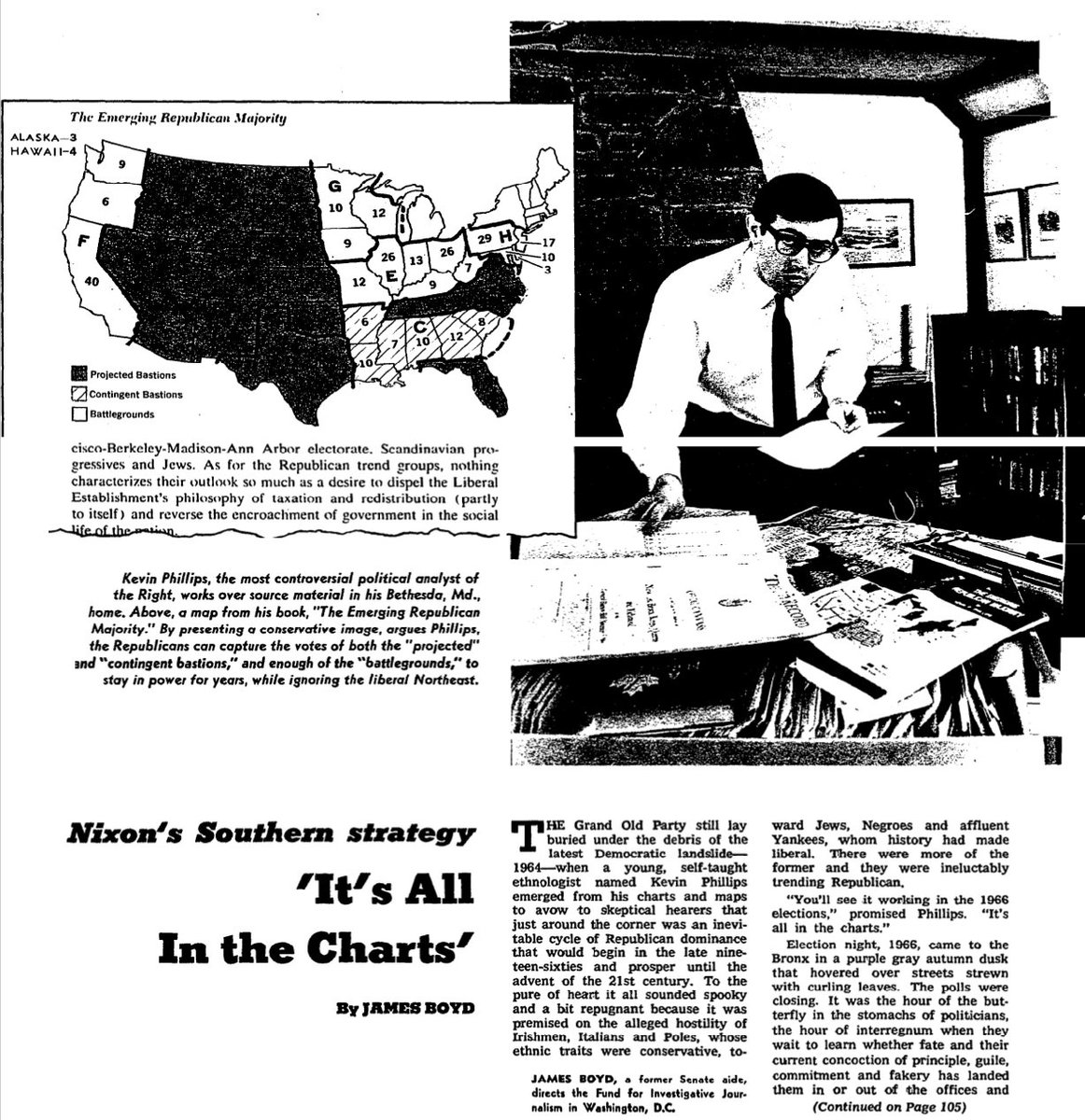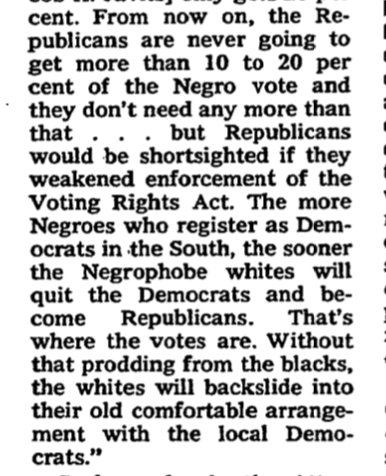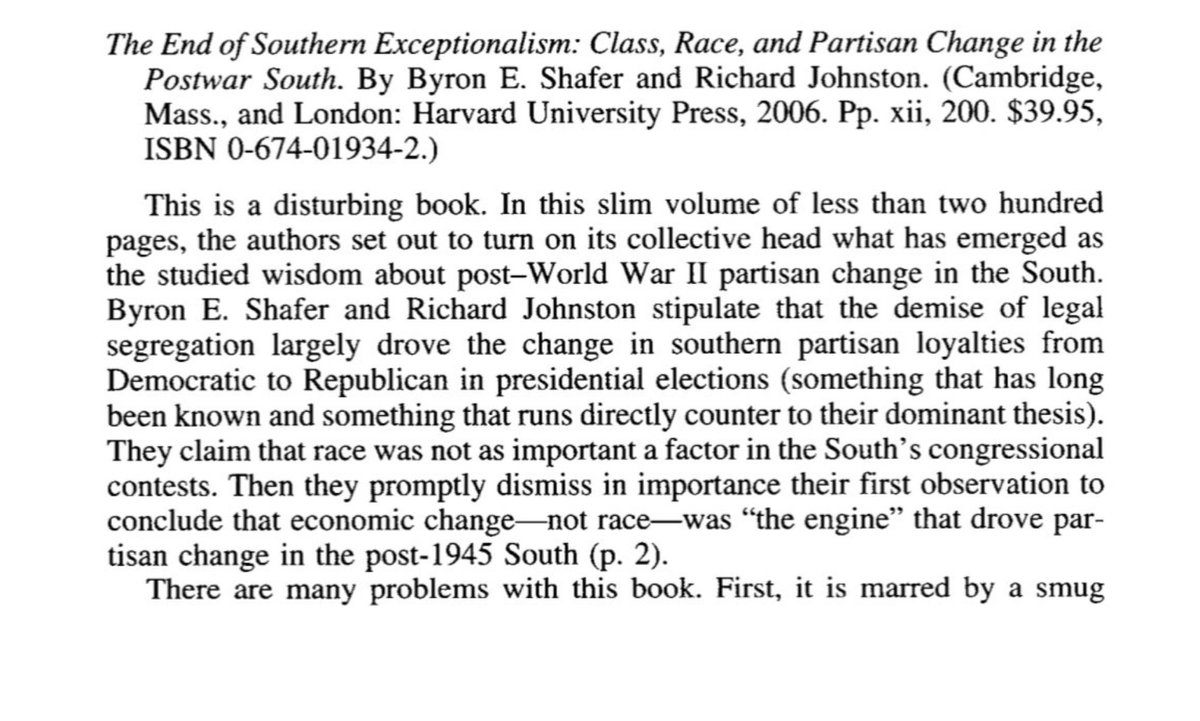Ask and ye shall receive.
https://twitter.com/DineshDSouza/status/1023983091553984524
I'll say at the start that I'm not going to pick apart the entire piece, mostly because I have real work to do, but also because the last time I fact-checked his claims at length, the sum total of his response was to call me a "pasty-faced white leftist"
https://twitter.com/DineshDSouza/status/1022947042690134016
I'm sure other historians -- or, really, any adult with basic reading skills -- will address D'Souza's claim that Abraham Lincoln, the big-government liberal whose re-election was celebrated by Karl Marx, would have been some kind of Trump toady were he alive today.
That said, it's notable that his section on "Did the Parties Change Platforms?" never discusses the GOP platforms of the 1860s, but immediately switches to focus solely on Lincoln's "core philosophy."
Hmm, I wonder why he ignores what the GOP did then?
Hmm, I wonder why he ignores what the GOP did then?
https://twitter.com/KevinMKruse/status/997093209565085696
Anyway, I'll just focus quickly on "The Myth of the Southern Strategy."
D'Souza claims Nixon strategist Kevin Phillips never planned to pursue racist southerners.
And yet Phillips in a 1970 interview predicted "Negrophobe whites will quit the Democrats and become Republicans."



D'Souza claims Nixon strategist Kevin Phillips never planned to pursue racist southerners.
And yet Phillips in a 1970 interview predicted "Negrophobe whites will quit the Democrats and become Republicans."




But how could the GOP reach such voters without explicit racist appeals?
D'Souza asks, in a typical fake-naive question, could it be "code words" and "dog whistles"? Why that sounds ridiculous!
Isn't that right, former GOP strategist Lee Atwater?
D'Souza asks, in a typical fake-naive question, could it be "code words" and "dog whistles"? Why that sounds ridiculous!
Isn't that right, former GOP strategist Lee Atwater?

Here D'Souza brings my own book White Flight into it.
Again, in fairness to actual leftists, I should note here that I'm not a leftist, but as we've seen fealty to the facts is not D'Souza's forte.
Again, in fairness to actual leftists, I should note here that I'm not a leftist, but as we've seen fealty to the facts is not D'Souza's forte.

I'll just note quickly that I didn't "portray" white flight as racist. Instead, I directly quoted racists being racist.
Here's the opening anecdote from White Flight. They didn't flee "inner-city crime." They fled middle-class blacks buying homes in their neighborhoods.


Here's the opening anecdote from White Flight. They didn't flee "inner-city crime." They fled middle-class blacks buying homes in their neighborhoods.



And yes, white-flight suburbanites did "secede" from the city.
They vowed to "build up a city separate from Atlanta and your Negroes and forbid any Negroes to buy, or own, or live within our limits."
They fought metro programs (like rapid transit), linking them to integration.



They vowed to "build up a city separate from Atlanta and your Negroes and forbid any Negroes to buy, or own, or live within our limits."
They fought metro programs (like rapid transit), linking them to integration.




Lastly, he says my depiction of these voters departs from Norman Mailer's account in Miami and the Siege of Chicago.
Wow, Norman Mailer found nothing objectionable there?
Wow, Norman Mailer found nothing objectionable there?

Oh wait, just a few pages before that passage, Mailer notes how that same "suburban America" was waiting for "Super Wallace."
The "atmosphere of the Republican convention" was so toxic on race he found his own previously liberal attitudes to blacks turning noticeably uglier.



The "atmosphere of the Republican convention" was so toxic on race he found his own previously liberal attitudes to blacks turning noticeably uglier.




Moving on -- yes, Nixon had a liberal record on civil rights, supporting everything from Brown to the CRA & VRA.
Which is why, as he worked to get the 1968 nomination, he relied on Strom Thurmond to convince segregationists that he was all right. From @CrespinoJoe's great bio:


Which is why, as he worked to get the 1968 nomination, he relied on Strom Thurmond to convince segregationists that he was all right. From @CrespinoJoe's great bio:



In the same vein, the changes in the GOP platform over the 1960s are instructive.
When Nixon first ran in 1960, it had a huge section on civil rights. When he ran again in 1968, not a word.
When Nixon first ran in 1960, it had a huge section on civil rights. When he ran again in 1968, not a word.
https://twitter.com/KevinMKruse/status/1022886384770723840
OK, enough on that, what was going on in the Democrats?
I'm going to dig a little deeper here, because it shows how fast and loose D'Souza plays with the evidence.
I'm going to dig a little deeper here, because it shows how fast and loose D'Souza plays with the evidence.
First of all, remember that "politicians switching parties" is *not* how scholars track the process of party realignment.
D'Souza insists that's the metric scholars use (while never providing a source for his straw man) because he knows how rare it is:
D'Souza insists that's the metric scholars use (while never providing a source for his straw man) because he knows how rare it is:
https://twitter.com/KevinMKruse/status/992842365953085442
But fine, let's meet this claim on his ground.
Here's a list of senators who didn't change parties in the aftermath of the 1964 Civil Rights Act. Most of these are big names with powerful positions in the Democratic Party, nicely illustrating why elected officials didn't switch.
Here's a list of senators who didn't change parties in the aftermath of the 1964 Civil Rights Act. Most of these are big names with powerful positions in the Democratic Party, nicely illustrating why elected officials didn't switch.

Just a few quibbles.
Thomas Gore died in 1949 and Kerr Scott died in 1958; so … no, they didn't switch after 1964.
Herb Walters was a caretaker appointed for sixteen months -- not sure he's worth mentioning once, much less *twice*.
"Senator William Murray" wasn't a person.
Thomas Gore died in 1949 and Kerr Scott died in 1958; so … no, they didn't switch after 1964.
Herb Walters was a caretaker appointed for sixteen months -- not sure he's worth mentioning once, much less *twice*.
"Senator William Murray" wasn't a person.

Several of the big names left -- Johnston, Hill, Russell, Holland, and Robertson (Pat's dad!) -- never ran for re-election after 1964, choosing to enjoy the seniority they had as Democrats for one last term. They all retired and/or died between 1965 and 1971. 

Let's turn to the governors he lists as Dixiecrats who hadn't changed parties by the late '60s.
William H. Murray (Oklahoma governor, not a senator) and Fielding Wright both died in 1956, while Frank Dixon died in 1965.
So, yes, they didn't switch. Because they were dead.
William H. Murray (Oklahoma governor, not a senator) and Fielding Wright both died in 1956, while Frank Dixon died in 1965.
So, yes, they didn't switch. Because they were dead.

Meanwhile, here is a segregationist Dixiecrat governor -- Mills Godwin, who managed to live into and through the 1960s. Oh look, he did switch parties.
https://twitter.com/KevinMKruse/status/1013981480786251778
D'Souza: "I don’t have space to include the list of Dixiecrat congressmen and other officials. Suffice to say it is a long list. And from this entire list we count only two defections."
Well, the royal we should count again. Here's a list of thirty:
Well, the royal we should count again. Here's a list of thirty:
https://twitter.com/KevinMKruse/status/1013981447609253889
Lastly, D'Souza returns to the one scholarly source he repeatedly uses, Shafer and Johnston's End of Southern Exceptionalism.
As I've noted before, the book was savaged by southern historians when it came out.
Here's Alabama's Glenn Feldman in the Journal of Southern History:


As I've noted before, the book was savaged by southern historians when it came out.
Here's Alabama's Glenn Feldman in the Journal of Southern History:



It's not just that they didn't name-check big books in southern history. Without grappling with them, they made some *incredibly* flawed assumptions about the South.
For instance, as a starting point, they assume racism is connected to physical proximity between the races:
For instance, as a starting point, they assume racism is connected to physical proximity between the races:

So, whites who fled Atlanta & said they'd build forts along the Chattahoochee to keep blacks out of Cobb or formed "No N-ggers in Gwinnett" were less racist, as there were so few blacks in these 95%-96% white counties.
Whites who stayed in integrated areas? *More* racist.
OK.
Whites who stayed in integrated areas? *More* racist.
OK.
This then is D'Souza's ultimate conclusion: "As the South becomes less racist, it becomes more Republican."
This is, once again, contradicted by the actual history of the early wave of Southern Republicans, who were just as racist as older Dixiecrats:
This is, once again, contradicted by the actual history of the early wave of Southern Republicans, who were just as racist as older Dixiecrats:
https://twitter.com/KevinMKruse/status/993475118058926080
But -- and it's odd for a historian to say this -- I'd argue that what's more important than the history here is the current state of the two parties.
(Again, my apologies to the very angry, very vocal PBR fans.)
(Again, my apologies to the very angry, very vocal PBR fans.)
https://twitter.com/KevinMKruse/status/1022517518278250496
I suppose, as the current Republican Party is experiencing a surge in candidates who are openly white supremacist, it might seem easier to try to rewrite the past than it is to reckon with the present.
But it'll take someone better than D'Souza to do it.
vox.com/2018/7/9/17525…
But it'll take someone better than D'Souza to do it.
vox.com/2018/7/9/17525…
• • •
Missing some Tweet in this thread? You can try to
force a refresh





